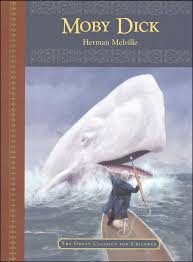As an Education major as well as an English major, I find myself contemplating the educational value of reading texts that I am introduced to in my classes (I know it’s nerdy, just go with it). I ask myself a slew of questions such as: Why are we being asked to read this? What can we take away from this? What am I gaining as a reader? What am I gaining as a human being? Herman Melville’s Moby Dick was no exception. As I progress further into the novel, there is no denying that the text is a timeless classic for a reason. It is not only an intriguing tale about a fishing trip gone wrong, but also presents the reader with valuable lessons about race, religion, revenge, sexuality, identity, etc. My question now is this: How can we share this wealth of knowledge with younger generations?
That’s when I stumbled upon this version of Moby Dick:
(http://www.barnesandnoble.com/w/moby-dick-herman-melville/1116610565?ean=9781403705976)
This is an abridged version of Melville’s novel (only 192 pages) designed for readers ages 7-18. It has been condensed and adapted in a way that maintains the storyline and all of the important themes and images present within the text, but is more accessible to younger readers than our 427 book. The chapters are lengthy, but are accompanied by illustrations, and the font size has been enlarged. This version also contains an introduction to the characters in the novel, as well as a page about Herman Melville at the end. The best part is, this version of Moby Dick is part of a series of classics turned into children’s books called Great Classics for Children. The rest of the series includes famous titles like Adventures of Huckleberry Finn, Alice’s Adventures in Wonderland, and Treasure Island.
I was so excited to find these, because I think that the introduction of classic stories at such a young age is beneficial to children (and it’s something that I know 7 year old Brianna would have enjoyed). Why not let young minds soak in the lessons of these great stories as soon as possible? Why not let them imagine that they are running away to Neverland with Peter Pan and practice their reading and comprehension skills at the same time? Don’t you think that an individual exposed to the Alice’s Adventures in Wonderland as a child, one who grew up with it, one who is familiar with it, would be more apt to enjoy studying it when they get to college? Of course all of this depends on the child and their interest level, but even just giving them the opportunity to get to know these texts at that age is a great advantage.
Okay, my educational rant is over, I promise, but below is a link to the collection on Barnes and Noble’s website should you be so inclined to purchase one for a young reader:http://www.barnesandnoble.com/s/?series_id=351049
In addition to printed access to Moby Dick, I also came across an animated version of the tale geared towards children on YouTube. It’s pretty entertaining, if I do say so myself.


Brianna,
I love this post! I found these same type of books in my local bookstore a few months ago and was so excited! I think that children are more apt to read when they are younger, and having these adapted versions of the classics may make them more motivated to read the real versions in the future. Hopefully, this will make them keep reading into young adulthood and have them not think of it has “boring” once their surly teenagers!
I really enjoyed reading your post! I think it is very important that young children be exposed to all sorts of classical literature in fun and interesting ways so that their interest is maintained for years to come. The adapted novel and animated version of the tale appeal to the youth because of there accessible natures and great illustrations. The best time for someone to learn a language is when they are child because of language development and language acquisition. If it is better to start younger with a foreign language, why not with novels and texts as well? For a child to have this opportunity, would be extremely beneficial and rewarding!